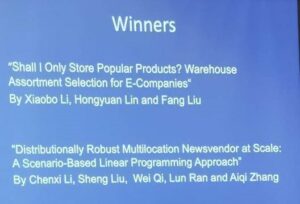
Heartfelt congratulations to our Assistant Professor Li Xiaobo and his PhD student Lin Hongyuan on winning the 2021 Manufacturing & Service Operations Management Data-Driven Research Challenge!
Shall I Only Store Popular Products? Warehouse Assortment Selection for E-Companies – Xiaobo Li, Hongyuan Lin and Fang Liu
Below is a short description of the work presented at the competition.
2021 Manufacturing & Service Operations Management Data-Driven Research Challenge
This paper studies the single-warehouse assortment selection problem that aims to minimize the order fulfillment cost under the cardinality constraint. We propose two types of fulfillment-related cost functions, which correspond to different preferences toward spillover fulfillment and order-splitting. This problem includes the fill rate maximization problem as a special case. First, we show that the objective function is submodular for a broad class of cost functions. Second, we show that even the fill rate maximization problem is NP-hard. Next, we propose a simple heuristic called the marginal choice indexing (MCI) policy, which stores the most popular products. We find a general condition under which the MCI policy is optimal, and this condition can be satisfied by all classic discrete choice models and several multi-purchase choice models. Furthermore, we propose an enhanced mixed integer linear programming (MILP) formulation with the easy-to-implement benders decomposition scheme. Through the extensive numerical experiments on a real-world dataset from RiRiShun Logistics, we find that the MCI policy is surprisingly near-optimal in all the settings we tested. Simply applying the MCI policy, the fill rate is estimated to improve by 9.18% on average compared to the current practice for the local transfer centers (LTCs) on the training data set. More surprisingly, the MCI policy outperforms the optimal policy in 14 out of 25 cases on the test data set. This demonstrates that the MCI policy is robust to the change of demand function since it only requires knowledge of the marginal choice probability.

